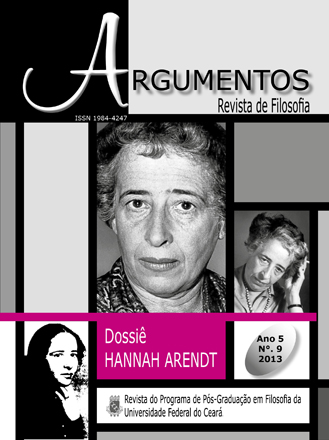The consequences of Socrates' condemnation: Hannah Arendt's critique of modern solipsism
Keywords:
Philosophy. Political. Sentencing. Socrates. Uniqueness.Abstract
In the Arendts’ perspective, since the condemnation of Socrates, opened a abyss almost impassable between philosophy and politics. This abyss did with that philosophy would be cut off from the womb of chores as well as public and passes the target man as a being singular, while aiming at the man in the perspective of plurality became exclusivity of the policy. This type of target, second Hannah Arendt, made with that authors such as Descartes, Husserl and Heidegger laughter, to the bosom of their works, what our author will criticize as being the modern solipsism, from which the man is seen as a unique being, isolated of the other, or, when next to them, if decays in relation to its authentic existence. Thus, the aim of this article and examine the consequences of the condemnation of Socrates to the area of political philosophy and, fundamentally, analyze how, this historical landmark/hermeneutic, man was understood, by philosophy, in its singularity naked and alienated from of other individuals.Downloads
Published
Issue
Section
License
Argumentos magazine is licensed under an International Creative Commons Attribution License.
The Magazine uses CC BY inclusion
1) The authors retain the copyright granted to the magazine or the right to initial publication, with the work regularly licensed under the Creative Commons Attribution, which allows the sharing of the work with acknowledgment of authorship and initial publication in this magazine.
2) The authors are authorized to contract additional applicable contracts, for non-exclusive distribution of the version of the work published in this journal (for example, publication in the institutional repository or as a chapter of the book), recognition of authorship and initial publication in this journal.
3) Authors are authorized and encourage to publish and distribute their work online (for example, in institutional repositories or on their personal pages) at any time before or during the editorial process, as they can generate productive changes, as well as increase the impact and reference of published work.




.jpg)










._._3.png)
1.jpg)
._._._.png)
